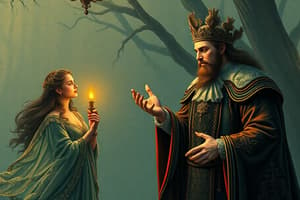Podcast
Questions and Answers
What role do the three witches play in establishing the theme of fate versus free will in Macbeth?
What role do the three witches play in establishing the theme of fate versus free will in Macbeth?
The three witches represent fate and prophecy, influencing Macbeth's actions and decisions, ultimately leading to his downfall by blurring the lines between free will and predestination.
How does Lady Macbeth's character evolve throughout the play, and what does this evolution signify?
How does Lady Macbeth's character evolve throughout the play, and what does this evolution signify?
Lady Macbeth starts as a ruthless instigator of Macbeth's ambitions but ultimately succumbs to guilt and madness, signifying the destructive nature of unchecked ambition.
In what ways does Macbeth's relationship with Banquo change over the course of the play?
In what ways does Macbeth's relationship with Banquo change over the course of the play?
Macbeth's relationship with Banquo deteriorates as Macbeth becomes increasingly paranoid and sees Banquo as a threat, leading him to plot Banquo's murder.
What significance does the imagery of blood hold in Macbeth?
What significance does the imagery of blood hold in Macbeth?
Discuss the significance of the motif of darkness and light in Macbeth.
Discuss the significance of the motif of darkness and light in Macbeth.
Flashcards
Macbeth
Macbeth
A dramatic work by William Shakespeare, telling the story of Macbeth, a Scottish general who is driven by ambition and prophecy to murder King Duncan and seize the throne. The play explores themes of power, ambition, guilt, and fate, with a focus on the corrupting influence of power and the consequences of unchecked ambition.
Motif
Motif
A recurring element or motif in a work of art, literature, or music, such as a theme, an image, or a symbol. In Macbeth, darkness and light are recurring symbolic motifs used to represent good and evil, life and death, and the supernatural forces at play.
Verbal Irony
Verbal Irony
A literary device that highlights the contrast between what is said and what is meant. In Macbeth, verbal irony is used to emphasize the characters' deceit and hidden motives. For example, when Macbeth says 'Fair is foul, and foul is fair,' he is suggesting that appearances can be deceptive.
Foil Character
Foil Character
Signup and view all the flashcards
Imagery
Imagery
Signup and view all the flashcards
Study Notes
Shakespearean Tragedy: Macbeth
- The play explores themes of ambition, moral corruption, and the destructive power of unchecked desire. Macbeth, a valiant Scottish general, is presented to us early in the play as a noble figure with a duty to his King, Duncan.
- Macbeth is profoundly affected by three witches' prophecies, triggering his ambition and ultimately leading him to commit regicide.
- The play highlights the profound connection between the supernatural and human action as depicted through the witches’ pronouncements and prophecies. This illustrates the dramatic impact of uncertainty and fear.
- The play presents a vivid portrayal of Scottish society as a place with political instability and internal conflict.
Character Analysis: Macbeth
- Macbeth's initial character is a valiant and admirable warrior and is soon corrupted through ambition and ultimately driven to commit horrifying acts.
- Initially, Macbeth displays loyalty to his King, Duncan, as well as respect and prudence.
- Macbeth's ambition is greatly influenced by the prophecies of the witches but is developed by Lady Macbeth.
- Lady Macbeth is a powerful and complex character who exerts a significant influence on her husband. Her ambition transcends Macbeth’s, pushing him to commit regicide.
Character Analysis: Lady Macbeth
- Lady Macbeth is a strong-willed woman who embodies ambition and ruthlessness. She is depicted as an intelligent and manipulative figure.
- Lady Macbeth's relentless determination to seize power and influence Macbeth highlights a conflict between gender roles and ambition.
- Her ambition ultimately leads her to mental instability and turmoil.
- The play illustrates the dramatic and far-reaching consequences of her actions.
The Witches and the Supernatural
- The three witches play a significant role as catalysts for Macbeth's downfall.
- They represent forces that are beyond human control.
- The witches’ prophecies are ambiguous, creating a sense of uncertainty and moral ambiguity. This reflects the play's broader themes.
- They sow doubt and create a climate of fear and unease which increases as the play progresses.
Themes of the Play
- Ambition: The play investigates the concept of ambition and the perilous consequences it can have.
- Moral Corruption: Macbeth's transgression into violence and murder represents a gradual decay in morality.
- Violence and Power: Macbeth’s decision to commit regicide is a display of the violent nature and seductive power of authority.
- The Supernatural: The play examines the role of fate, chance, and the unknown.
- Appearance vs. Reality: The characters' deceptive appearances vs. their true natures are contrasted.
- Consequences of Action: The play stresses that actions have far-reaching consequences.
Key Imagery and Motifs
- The use of imagery, including blood, darkness, and storms, creates a sense of atmosphere and foreboding.
- These motifs contribute to the play's overall sense of foreboding and the tragic consequences of unchecked ambition.
- The recurring imagery powerfully illustrates the psychological impact of the play's events.
- The references to and use of natural imagery contribute significantly to the dramatic portrayal of the theme's impact.
Plot Summary
- The Scottish play opens with a depiction of the Scottish war effort.
- The prophecy of the three witches influences Macbeth’s plan and desire to usurp the rightful King of Scotland.
- Lady Macbeth relentlessly drives Macbeth towards his heinous actions.
- Macbeth ascends the throne but his newfound control is riddled with fears and conflict.
- The play's climax escalates as the characters commit horrific acts of violence, and ultimately lead to their destruction.
- The play concludes with a violent resolution of the political turmoil and instability.
The Role of Conflict
- External conflict arises from Macbeth's ambition, highlighted by the conflict between his sense of duty and the witches' prophecies.
- The internal conflict within Macbeth escalates as the play progresses. Notably, his conscience causes significant suffering.
- The external conflict with other characters, namely the King and their enemies, intensifies as the play reaches its climax.
Studying That Suits You
Use AI to generate personalized quizzes and flashcards to suit your learning preferences.




